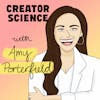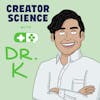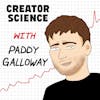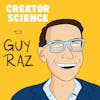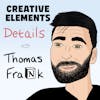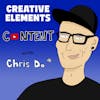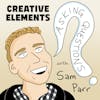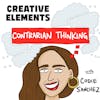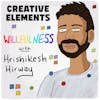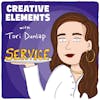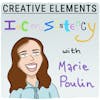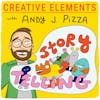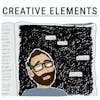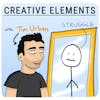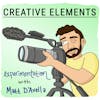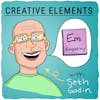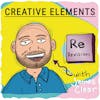
#2: James Clear – Habits, research, and how to create A+ work from a New York Times best selling author
Play EpisodeJames Clear is a personal development keynote speaker and New York Times bestselling author of Atomic Habits.
James Clear is a personal development keynote speaker and New York Times bestselling author of Atomic Habits. His book sold over 1 million copies in its first 12 months and received a ton of critical acclaim. In this episode, we discuss the lessons learned from writing a best selling book, the sacrifices required, and what it truly means to do A+ work.
Transcript and show notes can be found here
***
LISTENER SUPPORT
Join our community on Facebook
Support this show through Buy Me A Coffee.
***
SPONSORS
Try Podia and save 15% for life as a Creative Elements listener
Start your free trial of SavvyCal and get your first month free using promo code ELEMENTS
***
ABOUT JAY CLOUSE
Subscribe to my weekly newsletter
Enroll in my course on podcasting, Podcast Like The Pros
***
PODGLOMERATE NETWORK
This show is a part of the Podglomerate network, a company that produces, distributes, and monetizes podcasts. We encourage you to visit the website and sign up for our newsletter for more information about our shows, launches, and events. For more information on how The Podglomerate treats data, please see our Privacy Policy.
Since you're listening to Creative Elements, we'd like to suggest you also try other Podglomerate shows surrounding entrepreneurship, business, and careers like Rocketship.fm and Freelance to Founder.
Learn more about your ad choices. Visit megaphone.fm/adchoices
James Clear 0:00
Can you create something that is so good that the reader, the consumer, the user of your product could actually have a before-and-after moment with it?
Like before and after I read this book, or before and after I read this blog post, before and after I read this tweet even...
Before and after I used this product, my life, I can actually delineate and say it's different now because that experience was so good.
Jay Clouse 0:22
Welcome to Creative Elements, a show where we talk to your favorite creators and learn what it takes to make a living from your art and creativity. I'm your host, Jay Clouse. Let's start the show. Hello, welcome. Thanks for tuning into Creative Elements. You know just about every January I create a set of new year's resolutions. Maybe you do too. This year,some of my resolutions were to carve out more time to read, plan more dates with my girlfriend, Mallory, make fitness a priority. And yet, by the time March rolls around, I usually realize that I'm already falling behind on those resolutions. Why is that? Well, many of our behaviors boil down to habits. When we fall into a routine, we build habits and they stick. That's true for habits we want to build. And unfortunately, it's true for the habits we don't want to build either. Today I'm talking with a friend of mine and New York Times bestselling author James Clear.
Reporter 1:43
New York Times best selling author James Clear says you can fight the morning blues with an effective morning and AM routine. The keys to a productive life can be found in science--that's according to author James Clear who says breaking down tasks into small, achievable goals leads to higher productivity.
Reporter 2:02
New York Times bestselling author James clear wrote the book "Atomic Habits: An Easy and Proven Way to Build Good Habits and Break Bad Ones.
Jay Clouse 2:11
James is a personal development keynote speaker and New York Times bestselling author of "Atomic Habits: An Easy and Proven Way to Build Good Habits and Break Bad Ones." You just heard a few of his appearances on CBS This Morning, where he is a regular contributor. Atomic Habits sold over 1 million copies worldwide in 12 months, enjoying 12 straight months on the New York Times bestseller list, 33 weeks on the Wall Street Journal best selling list, and it topped Amazon's most sold list for 31 weeks. There are a ton of interviews with James all over the internet and the podcasting world talking about building habits in the book itself. But now more than a year after its release, I wanted to focus this conversation on what James has learned transitioning from a popular newsletter to now a best selling book. So in this episode, we talk about those lessons learned, the trade offs to taking on such a big project. creating good habits around your work, and why revision has been such a key element in his success. I'd love to hear your thoughts on this episode. As you listen, you can find me on Twitter or Instagram @JayClouse. But now, let's talk to James.
Jay Clouse 3:21
When did you start to identify as a writer?
James Clear 3:26
Honestly, probably not until this last year, really, which sounds kind of crazy because I had been writing for five or six years already. But for the first year, I didn't identify as a writer because I was really just kind of trying to figure myself out still.Probably took me six months, maybe honestly more like a year for me to actually find my voice. And I think that's true for any creative project. You know, if you're a photographer, let's say you need to put in a body of work to find your eye, or Ira Glass has that famous quote where he talks about the difference between your taste as a creative which is really good, you know what good work looks like early on, and your skill, it's just not there early on. And you need to produce a body of work to kind of close that gap between your taste and your skill. So early on, I was feeling that too. And so I needed the first year or two just to get over that. Then as I started to write more consistently, the business grew and I was always approaching it as an entrepreneur, so I thought about how fast the email is growing, what's our conversion rates, you know, all the other things that, that entrepreneurs think about. And so I probably, before I signed the book deal, I probably identified more as an entrepreneur than as a writer. And probably even more than an entrepreneur, I identified as like a craftsman or something. Like I wanted what I made to be beautiful in a certain sense, you know, not, it's not gonna be beautiful, the way a painting is beautiful, but it's gonna be like, the way you do it can be beautiful. So those are probably the identities I held on to most in the early years. But then, after I wrote the book, and the book came out, there's something about it being physical that changed it, you know, before everything I made was digital, but now it's like, no, I can hold this book in my hands and I can't, I can't really deny that I am a writer because, like, we have this physical artifact to prove it. And so I think something about it becoming physical made it more real in that sense.
Jay Clouse 3:49
I listened to a lot of interviews that you've done over the last year with the book release. And my goal is to not ask all of the same questions.
James Clear 5:19
Great. Sounds good.
Jay Clouse 5:21
So a year in after the release of Atomic Habits, you've sold over a million copies ,it's been reproduced in 40 languages, you've done 35 or more keynotes, 12 months on The New York Times bestseller list. What are some of the big takeaways you have now a year after releasing your first book?
James Clear 5:38
It's been a crazy year. This was my first book so I'm still kind of like flying blind and just learning as I go along. I don't know a couple of takeaways. The first is, like, I've told everybody I can tell about the book, like I don't have, there's nobody left for me to like market to or anything. So, and yet it's still selling and still going, and so probably one of the biggest marketing lessons that I learned is like, this sounds obvious, but the only way for something to really take off is it has to be so good that it sells itself. And, you know, if it was just up to me marketing at this point, it would the, you know, the show would be over, like it would, whenever I would do a podcast or write new blog post or you know, something, then copies would move. But it's kind of taken, it's sort of out of my control at this point. And I think that's because that maybe is the best signal that the book is providing value for people because it's so valuable that they're telling other people about it. And I say that not to like just pat myself on the back about it, but also like as a reminder to myself, because it was really hard when I was writing it. You know, depending on how you measure it, it took somewhere between three and five years to write the book. And especially for the first year or two, it was, I don't know I don't want to say it was like dark, but I, it felt dark a lot of the time, like I felt like it was in this cave writing, I wasn't getting any feedback. I was just, would show up and work for eight hours on it, and then it would look like just as much of a mess as it did when the day started. And a lot of creative projects are like that. And one thing I'm really glad about now is that I took the time to get it right. Tim Urban and I have talked about this the difference between doing A+ work and A- work. And it sounds like a fairly small thing, and it's like, hey, and A- or a B+ , like, that's pretty good, good, you know, nice job. But actually in any sort of media, books, podcasts, YouTube, social media, the internet provides infinite leverage. And so all the returns are at the tail end. And so doing A+ work is it's not like 1x or 2x or even 5x better, it's like 100x or 1000x better. And so I think it's worth it to take the time to do that.
Jay Clouse 7:49
I listened to an interview with Ryan Holiday, and he talked about the experience of writing books. And he had this quote that was like seared into my mind, which was basically, it's such a large project and body of work, that you can make progress every day, and it almost feels imperceptible on the whole of what you're trying to accomplish.
James Clear 8:08
For sure.
Jay Clouse 8:09
So in that like, darkness, how do you, how did you keep yourself going and like, I don't know if it's generating feedback for yourself, or like what kept you going and making progress towards as a plus work?
James Clear 8:20
Yeah, that's a great question. So I didn't realize this was going to be as much of an issue for me until I got into it and started to struggle with it a lot. You know, for the first three years that I wrote on JamesClear.com, I wrote a new article every Monday and Thursday. And so that feedback cycles pretty quick. You know, you write an article, you send it out, email it out to the list, and then you start getting replies from people. And that sort of instant feedback within an hour or so of being published is really nice. I did not realize how much I thrived on that. And really, a lot of the time, I would only need one good comment that said, Hey, you know, this is great. I really enjoyed this, to get me to show up the next time. You know, it doesn't take a whole lot of feedback to feel like, Hey, I'm on the right track here, I should keep doing this. And when I started writing the book, I used to write for a month, two months, three months, four months, I didn't get any feedback. Nobody said anything. It was just me with a Word document. And I didn't realize until I was maybe 6, 9, 12 months in, I don't know, it was a while, until I was like, man, I just need somebody to tell me that I'm on the right track here. You know, I don't need 1,000 people to read it and tell me it's great. But I need somebody to tell me I'm not like totally missing the mark. And so hiring an outside editor helped a lot for me. Then there's also, so that, that element of feedback, I think we could probably summarize it as signals of progress. You need signals of progress in pretty much any endeavor to feel like you should continue moving forward. And this is one of the benefits of tracking, like this is one of the reasons I write down my workouts, you know, my body, imperceptible change on any given day that you go to the gym, but at least I get some signal progress by writing down the reps. Same way with you know, posting or tracking your, you know, how many subscribers you have, or how much revenue the business is making or edits and feedback on a book manuscript, all that stuff. You just need signals of progress to maintain motivation. So that was, that was the first big part. But then there's a second piece, which is kind of just the mental perseverance or persistence of any creative project. And in my case, the question that I kept coming back to, if I never knew what to write, or I wasn't sure if I was doing the right thing, I just kept asking myself, 'What is the object of the reader's desire?' So in my case, it's a book about habits. The front cover says how to build good habits and break bad ones. And so if I ever didn't know what to write, if I wasn't sure if what I was working on was valid, valuable or not, I just asked myself, What is the object of the readers desire? Well, nobody is picking this book up except to build good habits and break bad ones. So if you don't know what to write, write about that. And that did help me quite a few times when I like wasn't clear about, is this section worth it or not? Well, does it help people build good habits or break bad ones? And there was a lot of editing and trimming and cutting that that happened because of that line in questioning.
Jay Clouse 11:02
So working on this somewhere between three and five years, what types of systems did you have in place to go through writing a book over that period of time while I'm assuming also keeping up with the stuff you already committed to doing anyway, you know, your bi weekly newsletter, hosting on any of the social medias that you're active on. Like, what did your systems look like for actually completing this book?
James Clear 11:24
Right. Well, first step was a lot of them got eliminated, sometimes by choice, sometimes by force. So I like, at first I tried to keep writing twice a week and I did that for about a year. So I was writing twice a week and I was working on the book, and that about broke me creatively. The last year, there were a lot of days where I, you know, I was posting Monday and Thursday, but then Monday and Thursday is turned into Tuesday night at 1am and Friday night at 1am. Like, you know, just like things started getting stretched a lot and I was like cutting myself too thin and pushing a little too hard. So eventually, after a year, I had to cut that down. So weed just posted on Mondays. So that freed up some space for me to just work on the book. And then even the last 6 months that I was writing Atomic Habits, I didn't write any new articles, and we just sent out kind of the best hits every Monday from previous articles, and I just spent those 6 months finishing the book manuscript. So some of that had to change in that sense. I literally was, I was wasting too much time on social media. So I, I realized about a year in like, Okay, I'm probably gonna miss this deadline if I don't get my act together, and I'm spending too much time, you know, getting distracted. So we came up with a force system where on every Monday, my assistant would log me out of Facebook, Instagram and Twitter, reset all the passwords. I would work all week. On Friday, she would send me the passwords. I'd log in over the weekend, and then we do it all over again on Monday. So I literally like just staying one step ahead of myself for probably a year or so. So, cutting it, cutting things out, blocking distractions out, and then also like I would be totally remiss if I didn't mention my wife and like the support that she was able to provide through that. You know, she made a lot of the meals, she handled a lot of the scheduling, she handled a lot of the just daily stuff around the house or things that needed to get done. So that was a big benefit. And thankfully, I've been able to pay that back a little bit too when she has big projects at work or when she runs a lot of major events. So you know, the week of that that event is happening, that I'm the one who asked to step up. So it's nice to be able to move that, to share that back a little bit. But she was really, really helpful and a lot of ways, and I said this in the acknowledgments of the book, but like we did it together in that sense. You know, it's a book or any project that is that big, any creative project, any entrepreneurial project, the shadow of that project is so long that it covers everybody else to, you know, they all, there's this ripple effect that everybody around you feels. You know, my parents felt it, my spouse felt it, my friends felt it. So me writing it was not justi, t was not just my life that changed. So I'm thankful to have a lot of support from the people around me, too.
Jay Clouse 13:56
What does a project of this scope do for you socially while you're in it? How does that impact your social life outside of that with your wife?
James Clear 14:06
Yeah, man, it's so interesting to think about while you're in it versus after it's done, because while you're in it, I basically limited my social life, I didn't really have one in the sense that, you know, most Fridays and Saturdays I was writing. I mean, I, you know, I had work to do. So, there was a period there where, yeah, I didn't have much of a social life. And actually, you know, my wife, her schedule was still pretty normal for her at that time. And so she had her friend group and things still happening. And most of the socializing I did was through her and her friends, like whenever they had something going on, and I would join, then I was out of the house, but there was nothing that I ever organized with like through my friends or whatever. You know, all that stuff would have to come to me basically. And naturally, you know, if you're waiting for stuff to come to you, the frequency of a decreases. So yeah, so it was definitely much less socially while I was in it. But then now, after it's done--and this is, this is a little bit more about about networking and a little bit less about like personal friendships--but you know, the best networking method ever is not going to cocktail parties or, you know, networking events or passing out your business cards, like none of the common advice that you hear. The best networking advices do interesting things and then share them publicly. And easily, Atomic Habits is one of the most interesting things that I've ever done and certainly one of the most public things I've ever done. And what happens if you do interesting things and you share them publicly, they become like a magnet for like-minded people. So people who are interested in the same topic, they just get attracted to it like a moth to a flame. And so I've interfaced with so many interesting people and companies and gained a few new friendships out of it too, just because the book has been produced. So the back end socially is actually really great. But there was certainly a period there in the middle of it where it was much less great and, you know, I was...Creative projects are lonely to a certain degree. You know, like you have to be able to flip that switch and stay focused. And I probably fall somewhere right in the middle of the introvert-extrovert spectrum, I can kind of go either way. And you know, for that period of my life, I was way more on the introvert focus, quiet, lonely, solo side. And then now, for the last year, I've been way more on the extrovert, public facing sharing the book interfacing with a lot of people side.
Jay Clouse 16:20
And what is that like? Do you feel like you're going to yo yo back? Do you feel like the draw to yo yo back to that? Or are you happy and enjoying this extroverted now, like, in the public eye type of...?
James Clear 16:30
I had somebody told me a couple months after the book came out that they've worked with a lot of authors, and they said, Yeah, I find that authors often have like a public mode and a private mode. And you kind of got to go back into private mode or monk mode toy, ou know, focus on your next project and write it. And then you come out for a couple years to share it and you know, send it out into the world. So yeah, I don't know, maybe there will be like a little bit of a cycle in that sense for me. I think that a lot of life is like that, honestly. People give advice on-- tend to give advice on one extreme or the other. You know, it's like hey, you need to get out and socialize, you gotta be in the mix. Or somebody else might be like, you need to stay focused and like avoid distractions and pay attention. And the truth is, all of us are both people. It's just you just need to be self aware and know what side of the spectrum you need to be on right now.
Jay Clouse 17:13
I was talking with another entrepreneur friend of mine, and he had a lot of stuff that was public facing, like, Hey, we just launched this campaign, we're sharing this now and look at this new product that we launched. And people are saying, Oh, my gosh, like you're killing it right now. And he and I joked, well, actually, you know, I was killing it six months ago. And so sometimes you're looking at what you can see that somebody is doing and what you can see of their strategy, but what's actually gotten them to this point happened months and months ago, and you have no idea what that looks like.
James Clear 17:40
That's great. That reminds me of a Jeff Bezos quote. Have you heard that, where they, they were asking about, at one quarterly earnings call, they're asking about like, Oh, this quarter, you know, looks great, like what you know, what are you guys doing for that? And he was like, this quarter was already locked in two years ago, like what we did a couple years back, I can't, I cannot control this quarter's earnings in any meaningful way. What we're doing today can impact the quarter two years from now. But I, this has already been decided. I love the idea of like I was killing it six months ago. And the way that you know is that I have results to show for it today.
Jay Clouse 18:10
Coming up after the break, I talk to James about his research and writing process. Welcome back to Creative Elements. We're talking with James Clear the author of New York Times best selling book Atomic Habits. If you read James' writing, you'll notice how much he pulls in stories and ideas from decades or even centuries ago. I wanted to talk to him about how he thinks about research in his writing.
James Clear 18:35
There is one element of writing that was fun for me, which is the connection of ideas that were not previously connected. You know, like I'll read one idea from somebody in an article or I'll have an idea after browsing Twitter for a while or reading a new book. And then I'll kind of put them in my Evernote file now, just sort of sit there for 6 or 10 or 12 months. And then I'll be reading something else and I'll come across a story and suddenly, I'll see a connection between it's like, I hate that I could tell that story to make that point that I've been holding on to. And that part of it is very fun for me. The connection of previously unconnected ideas. But the process of writing and of organizing your thoughts and revising those and tightening them and trying to distill it into something that's easy to understand, that's just effort, I think,
Jay Clouse 19:21
What's your process of doing research and holding on to a lot of information while you haven't quite made those connections yet? Because something that's always struck me about your writing is how much research or even just reading you have to do to pull out these quotes, these stories, that show these examples really well. How do you find those things?
James Clear 19:39
Yeah, it's a good question, because that is a big part of the process. I sort of think about writing kind of like driving a car. So I, I wrote for a few years, and then my audience kept growing, and I got to like 100,000 readers or so. And then I, for whatever reason, getting to that number made me think, oh, now people are really paying attention, so now I have to write like all the time, and now it needs to be really good basically. And so I spent more time writing, and it actually got worse. And I think the reason is because writing is kind of like driving the car, you like, go to a destination, you're like on this adventure. And reading is kind of like filling the car up with gas. And the point of having a car is not to only fill it up with gas and stay at the station, you have to drive somewhere and go on an adventure at some point. But you do need to stop and refill every now and then. And so for me, I really, if I ever struggle and don't have good ideas to write about, I need to read more need to fill up the tank.
Jay Clouse 20:35
How do you look for books or articles or things to read? Because a lot of these quotes you pull out from the 1800s and 1700s like there's no bounds of human history to your writing. So how do you decide where to start?
James Clear 20:47
It is really hard because I do, I think that's important for me. I consider myself like idea agnostic in the sense that I don't care where a good idea comes from, like doesn't matter what domain--biology, neuroscience physics, history philosophy,. Like, I'm opening to all that. It also doesn't matter what time period. Could be 1300s, could be 1500s, could be last week. You know, like, if it's a good idea, it's a good idea. And so I don't want to limit myself in that way. But the impossibility of that is that no person can be an expert on all that stuff. And so this is just magnified by the internet now. I think probably one of the greatest skills of our time is going to be curation. Because we all are like drinking from this firehose of information every day. And the ability to curate and filter is probably more important than ever before. Like you, if you think about it this way, the information you consume is like food for your brain, and it's like the precursor to your thoughts. So if you consume more high quality information, you get more high quality thoughts out of it. If you get more high quality thoughts, then you end up with higher quality actions because your thoughts are the precursor to your actions. So the process of filtering and curating the information that's coming into you is kind of upstream of every thought and action that you take. So in that sense, it's like an incredibly important thing to master. And I do not think that I have an ideal process for this. But one thing that I do is I kind of like go through people who have already used a filter. So, for example, I just read this book called "A Calendar for Wisdom" by Tolstoy. And it was interesting. I didn't know that he wrote it. It's one of those just like one a page a day kind of books, like, you know, January 1, here's three quotes February 1, here's three, quote, whatever. And so it takes you through all the the whole year, but it's, it was like a 10 year project for him, where he tried to combine wisdom from a bunch of different disciplines. Eastern thought, Buddhism, European writers, and philosophers wherever. He was very religious. There's a lot of there's like a lot of Christian themes in it, too. But the point is just that he heavily filtered and curated already. And so let me, let me use that. It's kind of like, if you learn from something that was well curated to begin with, you're kind of like starting from a higher principle. So that process I think, is helpful. And so asking yourself like who are the curators for each major discipline? And if you could find someone who is your go to for economic ideas and then somebody else is your go to for philosophy ideas and so on, that can help. That's not a perfect solution, but it at least can, can help you.
Jay Clouse 23:11
And then are you, do you read physical books or electronic books?
James Clear 23:15
I do, so I do both. And I actually, I've gone back and forth on this, maybe I'll continue to kind of have these cycles that I go through. Maybe five or six years ago, I was reading a lot of blogs. Then I pretty much stopped entirely and just read books because I thought okay, even for bloggers, your best ideas are usually in your book; they like take the best things from the blog, and they, that's how they build the book around. And then of course, it opens up like everybody who wrote before blogs, which is you know, the majority of human history. And I still think great books are an excellent format to consume in. But the problem with books sometimes is that they take a long time to make their argument. And this is definitely true of many new books. I don't bother with most new books, because they, they should be a 20 page paper but they're a 250 page book. And so Instead, what I've been thinking now is, where's the most density of wisdom? And actually, depending on how you do it, like, there's one guy I found who curates the best tweets that he's found throughout the week. And then he puts them into like a newsletter, like, Oh, that's like pretty interesting. It's like very dense, actually, you know, you like browse through hundreds of tweets, thousands of tweets probably every week, and then these are the 20 that are the best, that sounds pretty good. That's very dense. That book calendar for wisdom, things like that, that have collected a lot of things into very short sayings, that that's very dense. Blog posts tend to be denser than books in the sense of like, you can get the same point across in 1,000 words rather than 10,000 or 100,000. So I like, I do like things like that. The problem is, in both cases, it's hard to find the ones that are done well. When it's done well, it is way faster, you can get, you can get an entire chapter across in three sentences. But finding the people who do that well is the real challenge.
Jay Clouse 24:56
After the break, we'll talk about one of the most important aspects to James's work. Welcome back to Creative Elements. Curating and paring down information is one of James's specialties. He told me that revision is one of the strengths that has served him best throughout his career. Recently, he started a new weekly newsletter called 3-2-1, 3 ideas, 2 quotes, and 1 question to ask yourself throughout the week, James is on a mission to make this newsletter the most wisdom per word on the internet. And the key to that is revision.
James Clear 25:30
I think ultimately, for me, it always starts with asking myself like, yeah, how can I provide value right now? And what I realized was that since the book has come out, my time has become very tight. And I have a lot of new things that are impinging on my schedule that weren't there before. Like, you know, speaking requests is a good example. Okay, that sounds great, and it is fun, and I enjoy it. But it usually takes two days out of my calendar because I gotta fly to the place to talk, you know, talk to everybody do q&a, come back. And so that takes a couple days up that I can't spend writing, you know, a longer form or more in depth piece. Then we have a question like, am I going to start working on another book again soon? Okay, well, if you're going to do that, that actually takes up probably most of those days when you are home. And so it was kind of just a realization that I don't have the time that I used to have to write a long form piece. And so I need to decide, am I going to capitalize on the opportunities that I have right now and not have that much time, or am I just going to say no to those opportunities, and then have the time to write the article? And what I decided was, this is a unique period of my life, I am excited about the things that I'm doing. So I want to keep doing that. But I still want to be able to provide value. And so if that's gonna happen, then the format or the form needs to change. And so I decided that I was going to scale it down and just do this 3-2-1, 3 short ideas for me, 2 quotes from other people, and 1 question to think about throughout the week, and the response has been great thankfully.
Jay Clouse 27:00
I love it.
James Clear 27:01
People have enjoyed it. Yeah. Do you like it?
Jay Clouse 27:03
I really, really like it.
James Clear 27:03
Yeah. So thank you. We're all busy. So you know, we do get benefit from, from that. And again, I mentioned, you know, just a minute ago, the hard part is compressing ideas, is, you know, really delivering a lot of value in a short amount of words. So in that sense, it's kind of a fun challenge for me, too. It's something a little different. You know, alright, I wrote the 250 page book. Now let's try to, you know, get like a life changing idea across in 25 words. So that, it's kind of, it is fun for me in that sense.
Jay Clouse 27:29
The interesting thing about my own behavior that I've noticed, I subscribe to maybe three to five newsletters that I'll read every week, yours being one of them. But a lot of them I noticed, or I have the thought of, I receive it, and if I don't have 20 minutes in that moment to look at it, I'll leave it unread to say, go back and look at it soon.
James Clear 27:50
Right.
Jay Clouse 27:51
This new series that you have, I know I can read it right now for the most part without it taking me too far out of my workflow or needing a huge time comittmnt.
James Clear 28:00
Yeah, it's gonna take two minutes max.
Jay Clouse 28:01
Right.
James Clear 28:02
Yeah, most of the work is not writing, it's rewriting. Most of the good like, benefits I've had from designing the website, which I, in my case, I've designed my own site, it was not the first draft of design that I have, it was the revisions of it. It wasn't the first pitch that we have for join the email list. It was the split tests and the, you know, and so on. And almost all the benefits I've had from creation and entrepreneurship have come through revision. And so there's a, there has to be a willingness to come back to things, to optimize things, to tweak things. And that raises like a second, a second interesting question, I think, which is like, what is the work that you enjoy enough that you keep returning to it? Because ultimately, you have to do that in order for it to become great. And I think it probably provides an insight into where maybe you have a competitive advantage over other people. Everybody wants the result. It's very easy to want the result. Oh, I want to have a podcast download a ton of times, I want have a big email list. Whatever. Like everybody wants that. So a lot of people will start an email list or start a podcast because they want that outcome. But what do you love coming back to and doing again and again, because if you love it, you're gonna keep sticking with it when it's no longer sexy, or that initial motivation is faded, or it starts to get boring for other people. And that is a real advantage I think in the long run. So I would say that revision was has been a really big part of it.
Jay Clouse 29:23
Let's dig into that a little bit. A lot of artists, creatives, entrepreneurs, they have a little bit of shiny object syndrome, or they just get excited about making the next thing. So how do you draw the line, or how do you think about drawing a line between, I need to continue to produce new and get that out there and build a body of work and have the research paper to see if one of them hits versus maybe I should take a little bit more time on this piece that I've already put a ton of work into making and get to that A+ level of work as opposed to the A-?
James Clear 29:51
Yeah, that's a really good question. I don't know that I have a perfect answer. I'll tell you like a couple different ways I think about it, but it's a really challenging thing I think for any creator to figure out the right balance to that. So the first question is like, Am I getting results or not? And if you are getting the results that you want, if things are moving forward, then Okay, maybe you can just kind of continue with the current pace that you have.
Jay Clouse 30:12
These signs of progress you we're talking about earlier.
James Clear 30:13
Yeah, yeah, signals of progress. I think that definitely for sure helps. But there's a second filter, which I think about, which is early on in your career, I think it's important to let the schedule drive the work because you need to develop your voice or develop your style or consistency or whatever. Like, I think that reliability early on--and we can debate how long it is, is it a years, three years, five years, I don't know--but it, for some period of time, I think there needs to be consistency so that you can sort of like build your skills at whatever it is you're practicing. After that, that period has been done, then you've kind of earned the right to think a little bit more carefully about, okay, maybe I should break the pace that I've had so that I can do what I was talking about earlier, that A+ work so I can really make space for that. Now, there is a caveat to that that I think can help along the way. And this is kind of how I have tried to approach my creative process, which is, I want the schedule to drive the work in the sense that I want to be reliable. I think reliability is probably one of the most underrated creative traits, especially because we often talk about creativity as something that is spontaneous or something that strikes you, a spark, it's unpredictable. You have to kind of unearth creative genius, but reliability counts for so much, especially when it comes to building an audience. So I think that that's really crucial. However, I have this internal quality bar that I just like cannot get myself to release anything that is not good, or that I feel like has not reached a certain standard. It never feels perfect to me, it never feels good enough, but is it, like, good. So the compromise that I've come to with myself is something has to get out but I don't care how--what I will compromise on is not the schedule and not the quality, but I will compromise on the scope. And so something's got to get out on Mondays and Thursdays. That was the first three years of my career in writing. I don't know how long or how short it's going to be, maybe the best thing I can do is write one good paragraph. I don't know how I'm going to feel about it. But something's going to get out that day. And so I do still think about that, for all of the creative projects I have now. Even something like writing a tweet, any tweet that I write, it needs to be A+ work. Any email that I send, might be 3-2-1, might only take you two minutes to read, but it needs to be A+ work. When I work on a, do a podcast interview or when I write a book, like it should be A+ work. And so each thing I put out should be excellent. Even though the scope of it might change so that I can produce on a, you know, different schedule, depending on, you know, what the speed needs to be.
James Clear 31:49
So, creativity and doing big projects, things that haven't been done before, things that have your unique spin on them. They're almost innately or inherently something you have to discover as you do it. So what do you see as the interplay between processes and habits and allowing yourself to be creative and do things for the first time?
James Clear 33:09
Hmm, yeah, that's a good point. So I do think about writing in that way, in the sense that, for me, writing is thinking. I don't usually know what I think about something until I have written about it. This is actually an interesting thing to be saying on a podcast or in conversation, which is that a lot of the time when someone asks me a question, and it's the first time I'm wrestling with it, I don't really know my opinion. I'm kind of just talking my feelings. When I'm talking is like how that question lands me the first time, and then how I feel about it right now in the moment. But one of the advantages of writing is that I get to write how I feel the first time I toy with the idea, but then I get to revise how I feel. I get to go back over it again and again. And it's not until the 10th or the 15th or you know, many of my articles I've revised 25 or 50 times, that's when I'm finally like, Alright, this sounds right, this is this is how I actually feel about it. I almost wonder if we should be much more gracious with people in conversation for that reason, that people are just kind of talking their initial response, and the logical rational part of their brain may not actually deeply believe their initial version. If we gave people enough grace to revise that or to think through it carefully, they might come to a different conclusion. But because we assign someone's identity or values or priorities to their first response so quickly, it starts to become a little more toxic, I think, much faster for that reason. But that's kind of a side note. So your actual question though, about building habits and thinking about that spontaneity, that kind of discovery process of creativity, I sort of view it like, you have to be willing to produce a lot of garbage or average work in order for the like useful or sort of that, those moments of genius to be uncovered. And so it's sort of like a quantity game in that sense, in the sense that like, I'm going to try my best every time, but I know that every article I write is not going to be a homerun. But if I show up consistently, and I write eight or nine a month, then I know two or three of them are going to be decent. I just don't know what two or three they are. And so it's sort of that, I wrote an article about this one point called the equal odds rule. There's a study that showed that there were roughly equal odds for any academic researcher to produce a paper of like high quality and great importance in their field. And the thing that determined whether or not they did it was the quantity of papers that they wrote. So even if they worked at a prestigious institution, even if they had previously written a really valuable paper, is basically the equal odds rule. It's basically, like you got to show up and run the experiment enough times for genius to strike.
Jay Clouse 35:43
So we know James has already experienced some success in his writing career. You may say that genius has struck a couple of times. ut I wanted to know now several years in, what would you focus on if you were starting over? I love what you're saying about this idea of putting in the practice to get to the, the level of skill development. So things start to feel easier after you've been doing them for a while, like at the beginning, it's how do I build this website, what do I build it in, what matters? And then at the end, you've done it for three, three years, maybe, and you've made tweaks for three years, your website, and you say, I actually know the two levers that I actually need to play with here. So I'm going to rebuild this from scratch, knowing what my goals are and what levers actually matter for that. Now that you're a year past the release of a book, what would you change about your process? You know, you're still flying blind on what it's like to be a year out. But now that you've actually released it, what would you change about the process?
James Clear 36:34
Yeah, this is an interesting question. I think you can apply this to pretty much any area, which is, in any domain, only a few things matter, but only the expert knows what to ignore. You know, it's like focus is the art of knowing what to ignore. But you only gain that ability, you only master that art with experience. And so there's a lot of things that, you know, we do early on that are just trial and error. But in my case, so with the book or with writing, yeah, you can think about this as like classic 80/20 rule, right? Like, well, you know, what levers make the most difference, where you're gonna, where do you get the majority of the results with the minority of your actions? And I think ultimately it comes back to two things there. There are other elements too, which I'll touch on briefly. But the two things that really matter are, number one, are you providing value? Comes back to that question I asked earlier, what is the object of your readers desire? What is the most valuable or useful thing? Can you create something that is so good that they--the reader, the consumer, the user of your product--could actually have a before and after moment with it? Right like, before and after I read this book, or before and after I read this blog post, before and after I read this tweet even before and after I use this product, my life, I can actually delineate and say it's different now because that experience was so good. So you know, that's a very high bar to hit and not possible every time, but I think always worth striving for. So that's the first piece I think is value. Second piece is reliability, what I said a minute ago, but in a, I think, a little more nuanced way. I think I could summarize my business model in a sense just by saying create things that people love in formats that scale. And so that first part, the quality, that's the things people love. That's the stuff that really provides value. But the second part, in formats that scale, that really matters a lot. And so you need a couple things for formats that scale. You need stuff that is widely distributed, so leverage is the internet in most cases. Fairly cheap or free to replicate the next thing, like it doesn't cost anything for another audio book of Atomic Habits to sell or for another ebook to sell, doesn't cost anything for another--relatively--for another email to be sent out to someone who subscribes to the list. So those formats--books, email list, social media, YouTube videos, Instagram posts--those are, those are relatively infinite in their scale, and producing things people love in those formats, man, that really gives you a powerful combination for building your own platform. And that's kind of the ultimate punchline I'm trying to get to here, which is, it's a slow game, but it's always worth it to build your own platform, because when it comes time to launch the next creative project, that's the 80/20, that's the thing that's going to move the most. And that was true for the launch of Atomic Habits; the thing that made the biggest difference was my own platform. You know, I mean, it helped a lot that we had 500,000 people we could email on launch day. I mean, that, you know, that's that platform drove the majority of the the launch push. And if you combine that with something that's really valuable, and does actually give people that before and after a moment, that does actually provide meaningful value, then you're in a really good position for it to kind of take off and do its own thing.
Jay Clouse 39:37
Love that. All about leverage. You know, how do you build leverage that you can then reap the benefits of having that leverage?
James Clear 39:43
You can kind of imagine it like the way that investors place bets on companies, creators place bets on ideas. And each company that a venture capitalist invests in is sort of like a lottery ticket, if we want to term it that way, in the sense that they're like, Hey, I'll you know, put a certain amount of money down, and maybe this lottery ticket can be cashed in, in three years or five years or something. But with businesses, you've got kind of a finite window where that can happen, like venture capitalists might give you three to five years, they're probably not gonna give you much more than 10. Like, it's probably that's about the window of opportunity. But if you write something really great, if you create something amazing, that can sit there, and maybe it'll work for you, you know, maybe if it doesn't go viral this week, when you publish it, it could go viral a year from now, or 10 years from now, or you know, I mean, we're reading meditations by Marcus Aurelius, that things 2,000 years old, right, and it's still getting quoted on Twitter and spreading all over the place. So writing is a very durable form of a lottery ticket. It's a very durable, has like a longevity to it in the sense that it can be cashed in at anytime. So you can sort of think of it as each great thing that you create is like dropping another lottery ticket, you know, in the bucket, like kind of tossing it out into the world, and maybe it'll be cashed in at some point. And the more that you do that, the more that you are exposing yourself to the upside or to the benefits of that work. And if you get enough exposure to things that could take off like that, you just, all you really need is for time to work for you. At some point, one of them's going to take off, you don't know which one, but you put yourself in a good position,
Jay Clouse 41:12
It strikes me that a lot of people who are building platforms for themselves now, it goes back to your reliability point, a lot of them are consistently hitting sort of the same themes. And so for a long time, you've been talking about habits and systems and processes. So as you think about your next lottery ticket and your next creative projects, how much do you think about that consistency that you've done to this point, and how important that is for the next book, the next anything?
James Clear 41:37
Yeah, that so there is you can sort of imagine this, like all those concepts we're talking about, in kind of like a fractal nature in the sense that at the smallest scale, the tweet or the blog post or something like that, it's got to be A+ work it's a little lottery ticket that maybe it could go viral but probably isn't gonna like totally change your career, but it just gives you like exposure to some good upside, add more subscribers, build the audience, provide more value, etc. But then as you, like, expand this kind of fractal idea and you start to layer lottery tickets or ideas on top of each other that are all in the same theme...So you know, I've put out--if we want to, you know, continue this metaphor--1,000, lottery tickets on habit based ideas, right. And so now we've got all these little things that any one of them could go viral, most of them won't, but maybe a few will take off, but they're all on the same theme, they all kind of have the same arc. Now you're starting to build a brand. And I think that this is another reason why reliability is so important. In the long run, your brand is the work that you do. In the short run, your brand might be a slogan or a campaign or logo or you can shape it a little bit. But in the long run, your brand is your reputation and your reputation is the value you provide. And so you need to do that in a consistent fashion. You can think of your brand as kind of like a spread of outcomes or a spread of what you create. And the tighter that spread is, the tighter that funnel is, the more clear the brand is.
Jay Clouse 43:00
It's like a best fit line.
James Clear 43:01
Yes, right, yeah, it is the best fit line, that's actually a really good way to put it. Imagine you're throwing all those ideas up onto a graph, and the tighter that they are. And the tighter that correlation is, the more your brand has a best fit with that particular arc. So the more reliable you are both in your quantity, your pace, and in what you deliver, so the quality...You could say you could do reliability on at least three different axes here, you could do quantity, reliability, and like theme or content. And so if you're producing the same kind of topics on a, in a reliable fashion, reliable pace, with great quality, eventually that becomes your brand. And I think that that has sort of happened with me with, with "Habits," and that's great. I'm really happy with it. I think it's one of the most important topics to talk about in life, so I'm very happy to have like develop that brand. As far as moving somewhere else, I kind of like something that is like adjacent to habits or like pairs well with it. I don't know what that'll be yet, but just decision making is like an interesting one. We all have habits, and we all make decisions. And those decisions can be very important. Building habits is important, but what habits do I build? Where should I focus my attention and energy? And you can have great habits, but focus them on an unproductive area of life, and it doesn't serve you that well. And you can have great habits and focus it on a very productive area, and suddenly you have a ton more leverage. So that's an example of a, I think, a way that I could maybe bridge that gap or move into a new area, is by asking yourself, alright, you have this, this best fit line now, and you're ready for the next project or the next phase, what is adjacent to that best fit line?
Jay Clouse 44:37
It's interesting to me that you said earlier on that you've always self identified as an entrepreneur more than a writer. And so many creatives who are talented and able to do such great work, they really struggle with this idea of consistency and trying to contain that scatter on the scatterplot. How do you think about the importance of having that consistency if you want to be an entrepreneur or a business owner as a creative?
James Clear 44:59
Yeah, it really comes down to what you want. You know, I mean, this is similar to the what we said earlier about the advice. You know, like, I, to a certain degree, I don't know another way to be, you know, like I, this is kind of what I'm encoded for or what I'm excited about. I like optimizing things, I like building a business, I like thinking about the big picture. You know, I don't just want to produce A+ work, I also want to run an A+ business, and that means having great margins, low costs, and, you know, I like, I like optimizing kind of the whole picture of it. I was talking to, his name is Locky Groom. He was an early employee at Stripe and basically had a great career there as an engineer, and then now he lives in San Francisco and kind of runs this investing thing. But he's known for kind of making like wise decisions and doing a good job with the arc of his career, at least early on. And I was asking him about that. And I asked him what his advice was for someone who was starting out in their career, who was looking to like, you know, put their career on a higher trajectory or whatever. And the first thing he said was, Well, I think that it only It makes sense for me to give advice to people who are relatively similar to me or at least similar to me and their disposition and personality and their objectives and goals. So like, there's this big caveat hanging over everything I say, which is, this is the advice I would give, assuming that you hold similar personality and disposition and ambitions to what I do. And that, that caveat should probably apply to every piece of advice ever. You know, like, yeah, it's good advice if this is what you're optimizing for. And that is probably like a key question of, you know, what am I optimizing for? What is my life really organized around?
Jay Clouse 46:32
Yeah, I wish that was a disclaimer, that everyone thought through that lens when they heard it, because...
James Clear 46:37
Right.
Jay Clouse 46:37
I've seen so many people who they get advice from someone they respected, admire, and now they're full bore at that thing until they realize, Oh, this isn't actually for me, and I can't go through the dip of the effort of what actually is required for me to do this path.
James Clear 46:52
There's a dangerous question of like, Am I climbing the wrong mountain? It's like, oh, man, I spent all this time doing this because I thought this was the path of success, but it turns If this wasn't what I wanted to optimize for in the first place. And it actually can be even more dangerous than that, because even if it is the right mountain for you, even if you do want to optimize for that, following the path that successful people follow is not always the wise decision for two different reasons. One is the world is dynamic, not static, and so the the path that they followed, or the strategies they used three years ago or five years ago or two decades ago, the world is a different place now. And so sometimes, those principles still apply if they're more universal, but other times those principles are no longer valid, or that strategy is no longer as useful. And then the second thing is, looking at what successful people do now is often very different than what successful people did early on. Let's say you're a basketball player, and you're like, Alright, I'm pretty sure the mountain I want to climb is I want to try to make the NBA. So then you ask yourself, Well, okay, what does LeBron James do? Like, what does his diet look like? And you think, Oh, well, you know, I should follow his diet. Well, actually, LeBron is like two decades into his career. Maybe the diet he's following, he's actually trying to like lose a little bit of weight so he's lighter on his joints and like can play longer and extend the length of his career. And you're a 17 year old who needs to bulk up and should follow a totally different diet. So it's still the right mountain, but the strategy doesn't even fit anymore.
Jay Clouse 48:16
You can tell when you talk to James that he really enjoys learning the ins and outs of every part of his business. His focus on being an entrepreneur or craftsmen became more and more obvious as we talked.
James Clear 48:27
And so for me, that whole process is fun, and identifying as an entrepreneur makes a lot of sense. If that's what you want, then the good news is, it is a skill, and you can build that. You know, like you can, the great thing about most skills are most of the the challenges that you face is there's a book on pretty much any of it. And you can read books on any of those topics. If you're not if you don't have a good profit margin, great they're a bunch of books about how to make profit in your business and like optimize that. If your costs are too high, awesome, there are a bunch of books on cost cutting, you can figure that out. And so, if you're willing to take that kind of approach where it's like each problem that I'm facing requires a skill, and I can develop those skills by reading and researching and interviewing other people who dealt with those problems and so on, then I think you're fine. But if what you really want to do is create, then maybe the, you know, everything requires a trade off. So the trade off of running it all and owning it all and getting a higher profit margin is that you have to spend time learning all those skills. And the trade off of not having to worry about any of that is you usually have to give up some of the money. So find somebody you can partner with, who can handle all the business stuff, and, you know, that's not what I'm optimizing for, but that's great, too. You know, if you want to spend your time just creating awesome things and don't want to think about business at all, there are plenty of people and businesses you can partner with. And this is kind of why publishers even exist, you know, authors, many authors, want to just write their books and come up with ideas and don't want to think about distribution and marketing and any of that. And the publishers like hey, well, you know, we'll handle that part of it. You don't have to think about how much inventory is in stock in Amazon or whatever. So I think on one hand the trade off is find great partners and make a little less money. And on the other hand, the trade off is, you're gonna have to build more skills and spend a lot of time figuring it all out and you have the cognitive overhead of managing all that. But you'll get the upside and if it's fun for you, then you'll get to do something you enjoy as well.
Jay Clouse 50:30
Big thanks to James for sharing the insights he's learned from publishing "Atomic Habits." If you don't have systems in place to help you be consistent in your work, please do something about that. You can see how important it was to James to consistently write for his blog for several years prior to his book launch. Building a platform around your work will help you too. I highly recommend picking up Atomic Habits if you haven't already. And if you're not on James's 3-2-1 newsletter, I recommend that, too. Links for both are in the show notes. Just go to JamesClear.com. If you liked this episode, please tweet @JayClouse and let me know. If you could take a moment to leave a review on Apple podcasts. that would mean a lot to. Otherwise I'll talk to you next week.
Most Popular Episodes
New to the show? Check out some of our most popular episodes.






